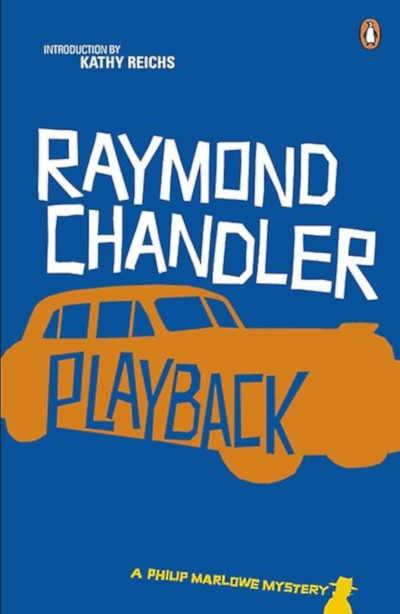|
Angels & Demons - Raymond Chandler's Playback

Playback
is a 1958 novel by Raymond Chandler and the last featuring his famous
and iconic private detective hero Philip Marlowe. Chandler died the
following year and wrote Playback in the midst of battles with
depression and drunkeness but the dark clouds of Chandler's last years
don't infuse the pages here in the same way they did with The Little
Sister. Playback is often a funny book with Marlowe given some
amusingly absurdist lines that could have been written for Groucho Marx.Chandler
even seems to be playing with the conventions of his own genre - with
no murder until the end and Marlowe actually siding with the person he
was asked to trail against the mysterious forces that have hired him
and those that encroach on his investgation. Marlowe remains an
interesting, complex hero as our window into these stories. He's full
of cynical bitterness but has a sense of honour and idealism. A loner
and borderline alcoholic who does his best to make the world a slightly
better place.The story begins
with a groggy Marlowe woken in his Los Angeles apartment at 6:30 am by
the telephone ringing next to his bed. Not a great time to be
telephoning Marlowe as he's usually only just gone to sleep at this
hour and needs three cups of coffee and a shower before he feels awake
and human. "Did you hear me? I said I was Clyde Umney, the lawyer."
"Clyde Umney, the lawyer. I thought we had several of them," replies
the deadpan Marlowe.Umney asks
Marlowe to trail a woman named Eleanor King from the train station to
wherever she might be going. "I want one thing very clear. The girl is
not to know she is being followed. This is very important. I am acting
for a very influential firm of Washington attorneys. I expect a high
degree of efficiency." Marlowe begins work on the case and discovers
that Eleanor is heading for a hotel in a coastal town named Esmeralda.
He decides to book into the same hotel but soon realises he is far from
the only person trailing the woman. Why all the interest in Eleanor
King? As usual in Marlowe's line of work, the case is about to become
increasingly complicated and dangerous.This
is generally regarded to be perhaps the weakest of the Marlowe novels
but despite its modest reputation I actually had quite a lot of fun
with this one and found it to be more readable and interesting than I'd
expected. It does have the faint whiff of a slightly unfinished work
(only about 200 pages) and with the 1960s breathing down everyone's
necks and technology laden heroes like Ian Fleming's James Bond now
firmly established, Phillip Marlowe is starting to look like a dreadful
anachronism but I think Chandler is aware of this and even has some fun
with the notion that his hero is starting to step out of his own
particular time and needs some sort of farewell. "Guns never settle
anything. They are just a fast curtain to a bad second act," says the
increasingly self-aware and postmodern Marlowe.Marlowe
even jokes to himself that private detectives will probably have cars
equipped with radar and rocket launchers soon. He's still Tarzan on a
big red scooter. The story was adapted from a (Marlowe free) unused
screenplay Chandler had written and while it does have a cut and paste
nature there are some memorable scenes and dialogue exchanges in the
book. Chandler did pen The Blue Dahlia and work as a writer on Double
Indemity and Strangers On A Train so any script he was involved in
couldn't fail to have something smart to work from.The
screenplay was going to be set in Canada and while Marlowe doesn't go
to Canada he is required to operate away from his familiar milieu of
Los Angeles. The main reason for this is that Chandler had been living
away from Los Angeles himself and was finding it more and more
difficult to describe the city from memory. So Marlowe is sent out to
the suburbs of another town and Chandler is able to use his knowledge
of places like Palm Springs to describe his surroundings. "Like most
small towns, Esmeralda had one main Street from which in both
directions its commercial establishments flowed gently for a short
block or so and then with hardly a change of mood became streets with
houses where people lived. But unlike most small California towns it
had no false fronts, no cheesy billboards, no drive-in hamburger
joints, no cigar counters or pool-rooms, and no street corner toughs to
hang around in front of them."The
cast of supporting characters works fairly well here because Marlowe is
in the dark as much as the reader at the onset of his investigation and
we have to work out who is who as much as he does. There are encounters
with gangsters, police, other private detectives, lawyers, killers, and
of course the "redhead" Marlowe is trailing and Umney's sassy
secretary. The latter inspires some sharp and witty lines and thoughts
from our long suffering hero.One
of the most famous passages in the book concerns a long philosophical
conversation about love, death and religion Marlowe has with a
gentleman named Henry Clarendon IV - a wealthy but lonely old man who
lives out his final years in expensive hotels. Clarendon is essentially
Chandler making a personal cameo in the novel and shares the author's
cynical and romantic traits. "Very few things amuse a man of my age. A
humming bird, the way a Strelitzia opens. Why at a certain point in its
growth does the bud turn at right angles?" Chandler's
tangents and navel-gazing somehow feel more appropriate here than they
might have done in earlier novels. In many ways the book is about the
small encounters and interactions of Marlowe rather than some big
central plot thread or villain. Marlowe seems to have his guard down
more than usual as if he almost can't be bothered anymore. A wry amused
disdain for the mean streets he's been inhabiting for far too long and
the games he has to play. He seems to yearn for human contact and is
perfectly willing to wisecrack even in the face of potential death.
When a goon warns Marlowe that that the private detective should not
get him annoyed under any circumstances, Marlowe's response is rather
Bob Hope/Groucho Marx. "Fine. Let's get you annoyed. What do you do -
bite your mustache?"There is more
romantic interest for Marlowe than usual although he's still just as
likely to be koshed over the back of the head by a heavy than have
something nice happen. Will the detective get a happy ending? You'll
have to read the book to find out. Chandler is not quite on top form
here but it's always quite cosy to slip back into this world and
Marlowe's sarcastic narration, even in the simplest of situations. "A
waiter came up and started to remove the place setting on the far side
of the table. I told him to leave it, a friend might join me. I studied
the menu, which was almost as large as the dining room. I could have
used a flashlight to read it, if I had been curious. This was about the
dimmest joint I was ever in. You could be sitting at the next table
from your mother and not recognize her."Playback
is not the best example of this series and you really need to have read
the other Marlowe novels to get the most out of it but if you like this
sort of period crime fiction or just Raymond Chandler in general you
should have a decent time with the book and enjoy this last Marlowe
adventure. - Jake
c 2019
Alternative 007
|

|


